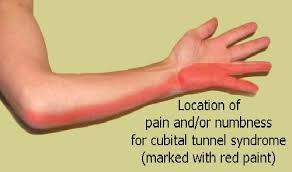Hand Health Resources considers Cubital Tunnel Syndrome as the second most common nerve entrapment syndrome occurring in the upper body or arm. Increased compression or pressure on the ulnar nerve in the elbow gives rise to this condition. Along with discomfort, this pathology may lead to the loss of hand functioning.
What do you understand by Cubital Tunnel Syndrome?
Ulnar nerve is a crucial nerve running through your arm and is responsible for sensation and movement of the forearm and hand as well. This Ulnar nerve passes through a tunnel of soft tissues named as ‘cubital tunnel’ that runs under a bony bump at the inner side of your elbow. The syndrome is called ‘cubital tunnel syndrome’ as it results due to the entrapment or irritation of nerve within the confines of cubital tunnel. This condition affects more men than women and the athletic performance of the athletes who are engaged in sports requiring strong hand or wrist movements. The entrapment causes tingling, numbness and pain along the inside of your arm down the ring and little finger.
What causes Cubital Tunnel Syndrome?
Usually, the syndrome occurs when the Ulnar nerve within the constricted enclosure of cubital tunnel is stretched compressed or irritated as there is a very little soft tissue to protect it. Other factors leading to the Cubital Tunnel Syndrome may include:
- Keeping the elbow bent for longer periods or repeated bending of the elbow
- Back and forth sliding of the nerve over the medial epicondyle
- Leaning on your elbow for longer periods of time
- Fluid build-up in the elbow
- A direct blow to the inside of the elbow as in the case of sports like; baseball, tennis, rugby, football etc.
- Athletic activities including repetitive overhead motions like; javelin throw, tennis serve or baseball
- Failure to warm up and stretch properly before a sport
- Elbow fractures, bone spurs, trauma or cysts
What are the treatment options suggested to treat Cubital Tunnel Syndrome?
Cubital Tunnel Syndrome usually responds to Physical Therapy. Initially the therapists advise to modify and avoid the activities, postures and positions causing Cubital Tunnel Syndrome. Other treatment options may include:
- Therapists will advice to avoid repeated flexion, over leaning and pressurizing the elbow
- Gentle exercises may be prescribed to ease the ulnar nerve glide through Cubital Tunnel
- A therapist may recommend or customize an elbow splint to keep your arm straight
- Stretching exercises may be prescribed to achieve full range of motion
- Therapist may provide a home exercise program and educate you about proper body mechanics
- Strengthening exercises like; strengthening of muscle groups, bending and straightening of elbow, forearm movement may be prescribed
- Nerve Gliding exercises may be advised to help the arm and wrist from getting stiff
- Range of motion exercises may be prescribed to enhance the mobility without causing pain or discomfort
- Special exercises to help the Ulnar glide and the exercises that mimic your daily and work activities may be prescribed
Contact Alliance Physical Therapy for the state of the art treatment of any of your musculoskeletal injury or problem. Our certified therapists use patient proven methods and develop customize treatment plans according to your needs and urgencies.
